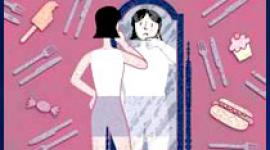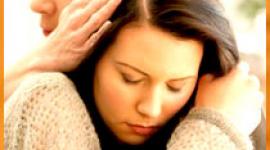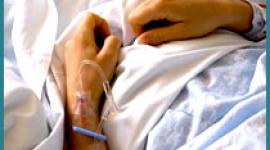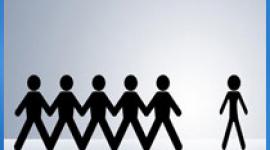The Truth About Life After Eating Disorders

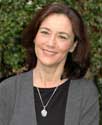
Our guest is Aimee Liu, author of the bestseller: "Gaining: The Truth About Life After Eating Disorders." Ms. Liu suffered from severe anorexia as a teen, thought she had recovered, then faced a severe relapse in her 40s. Now she says "I'm fully recovered."
During this exclusive HealthyPlace.com chat conference, Ms. Liu discusses her personal experiences with anorexia, the underlying causesof eating disorders and what getting "real" treatment for an eating disorder means. Maybe, more importantly, Ms. Liu shares what she found out through interviewing the top eating disorders researchers and treatment professionals in the world. What she has to say could very well help you or your loved one.
Natalie:HealthyPlace.com moderator.
The people in blue are audience members.
Natalie: Good Evening. I'm Natalie, the moderator for tonight's conference. I want to welcome everyone to HealthyPlace.com. Tonight, we're addressing the underlying causes of eating disorders and what getting "real" treatment for an eating disorder means.
Our guest is Aimee Liu, author of: "GAINING: The Truth About Life After Eating Disorders".
Aimee was suffering from anorexia during her high school and college years and thought she had recovered when she was in her twenties. That's when she wrote her first book on the subject entitled "Solitaire." 20-years later, during a tumultuous period in her life, she quit eating altogether. She now considers herself "fully recovered."
Good evening Aimee and thank you for joining us tonight.
Aimee Liu: Hi Natalie!
Natalie: So our audience members understand, Aimee - when you were 19, how did you get to the point in your mind where you said "I really need help."
Aimee Liu: In 1973, I reached what psychologist Sheila Reindl calls the "limit of distress." That summer, following my sophomore year at Yale, I had designed my life to accommodate the demands of anorexia. I'd broken up with my boyfriend, pushed my friends and family away. As a painting major, I argued that I needed the summer to be alone and paint.
I earned money working in a room by myself, matting prints for the Yale Art gallery. I house sat for vacationing faculty. And I painted in the otherwise empty undergraduate art studio. I ate less than minimally and walked miles back and forth to the studio every day.
One very hot evening in August, I reached the center of campus and noticed that I was all alone. Everyone else in the university, it seemed, was away on vacation. The whole city seemed to have emptied to escape the heat. I felt a crippling wave of loneliness, and it dawned on me that I had done this to myself, that the compulsion to avoid food and keep losing weight was making me unbearably miserable.
Although I didn't consciously connect the dots, emotionally I sensed that what I was avoiding was not really food but human contact; what I was so desperately afraid of was not weight but the risk of exposing myself to others - and yet what I most craved was human contact and intimacy. So I was denying myself what I most desperately wanted and needed.
It was a very, very distinct sensation and a very particular moment in my memory, and I've since learned that most people who recover can recall a specific turning point like this when they DECIDE they have to change. What's critical to understand, though, is that this turning point is only the beginning of a very long and variable process of recovery. (treatment for anorexia)
Natalie: What kind of help did you initially get for the eating disorder?
Aimee Liu: In 1973, I had never heard of anorexia or eating disorders, even though I'd been watching many of my classmates starving, bingeing, and purging since junior high school.
One of my high school classmates had been hospitalized -- but she'd returned with her face bloated from drugs, and no one ever mentioned what was wrong with her or what had been done to her in treatment. Another girl in a class behind me died from anorexia while I was in college. Still, no one named the problem, and when I did approach the doctors at the university, they ran me through a battery of tests and informed me that I "should gain a little weight." And although I'd daydreamed in high school about talking to a therapist, my family would not hear of this. So when I reached my turning point, it did not occur to me to seek professional help. Instead, I tried to think of the happiest, healthiest people I knew who would not judge or reject me for seeking their company.
Over the next two years, I watched these "normal" friends eat and party and talk, and I tried to imitate them, spending less time by myself, seeking out people who made me feel good and accepted. Two months after that summer turning point, I fell in love with a grad student who was so exuberant, so joyful, that I learned what it means to revel in life. He eventually broke my heart and I crashed hard, but in the meantime I'd learned enough from him to avoid sinking all the way back into anorexia. Instead, I became bulimic for several years. I wrote Solitaire as I was phasing out of bulimia - still on my own, with no therapy.
|
|
Natalie: And at that time, we're talking about the early 1980's, did you feel confident that you had beat this thing?
Aimee Liu: When Solitaire was published in 1979, I was 25, and I did think I was cured. As many people I've interviewed have found, it is enormously therapeutic to write out one's entire life story, to tell the whole truth in one's own words, and to see the connections between things that others have done to us and the behaviors that so often crop up in response, as well as the choices we make to excuse or cover up those events and behaviors.
But as important as it is to make sense of one's past, the bigger challenge is to adjust one's present choices and to develop the strength of identity and the skills to move forward. I'm talking about genuine self-awareness. And what I couldn't admit at the end of Solitaire was that this level of self-awareness still eluded me. I was still faking a lot of my confidence, still trying on and throwing off different roles and jobs and relationships in an attempt to find one that would tell me who I was. What I did not realize until many years later, when I wrote GAINING, was that I was still restricting, binge eating, and purging - but I was doing it with sex, work, friends, alcohol, and exercise, instead of with food.
This persistent tendency to punish oneself and inflict suffering on one's body for feeling imperfect in life; his is what I now call the half-life of eating disorders.
Natalie: I'm wondering, after you felt that you had recovered, was there an underlying worry that "the anorexia was hiding around the corner just waiting" or was it something that you didn't think about much, if at all?
Aimee Liu: Because I defined anorexia purely in terms of self-starvation and the confusion of hyper-thinness with identity, I really did think I was done with it. However, I remained a vegetarian well into my thirties, when I became so weak that I consulted a nutritionist who insisted I eat red meat (and when I did, I felt dramatically better overnight).
Into my forties, I still habitually tallied the calories of everything I ate (even when I wasn't restricting). For many years, I ran compulsively, especially during periods of emotional stress, and did more damage to my body through exercise than I had through anorexia. But I didn't see that all of these self-punishing compulsions were vestiges of my eating disorder.
Natalie: Aimee, you reach your 40s, and bam!, here comes the anorexia again. Was getting to the point of saying "I need help" harder this time around than the first time? If so, why? Or why not?
Aimee Liu: I do not think it's an accident that anorexia struck again when I separated from my husband after 20 years together. It did not strike when our marital struggles began a year earlier. It did not strike when we began therapy. It struck when I found myself alone with myself and realized I still had no idea who I was!
This, I've since learned, is exceedingly common among people with only partially resolved histories of eating disorders - who have been leaning on a spouse or partner to supply or prop up their sense of self. What was crucially different for me this time around was the therapist my husband and I were already seeing. He was not an eating disorder specialist, but he was a tremendously empathic and wise individual who refused to indulge me when I joked about the "benefits of the divorce diet."
At his insistence, I stepped back and learned to observe what I was doing without judging or denying it. I learned to be interested in my actions and feelings instead of running from them. Fortunately, I had not lost a great deal of weight and was nowhere near a dangerously low weight, so my brain was in good shape to cooperate with my mind in this process. I was in psychological but not physical distress, and that made it much, much easier to commit to therapy. I realized just how much of my life had been short-changed by my failure to enter therapy when I was in my teens. Better late than never!
Natalie: What, specifically, were the differences between the treatment you received after the eating disorder relapse compared to the first time in your 20s?
Aimee Liu: There was no comparison because there was no treatment when I was in my 20s! But in the course of writing GAINING, I've learned of many exciting new therapies and therapeutic practices - DBT, equine therapy, cognitive behavior therapy, and mindful awareness- which did not exist and certainly were not widely respected until recently. Mindful awareness has dramatically changed my life today. As the genetic research proceeds, there will also doubtless be more effective medications that should help some people.
(Ed. Note:Mindful Awareness is the moment-by-moment process of actively and openly observing one's physical, mental and emotional experiences. Mindful awareness has scientific support as a means to reduce stress, improve attention, boost the immune system, reduce emotional reactivity, and promote a general sense of health and well-being.)
Natalie: From your own personal experience and from interviewing researchers and treatment specialists for your book, can you summarize for us what it really takes to recover from an eating disorder?
Aimee Liu: Everyone is different, of course. Eating disorders overlap with so many other conditions - OCD, anxiety disorders, PTSD, personality disorders, depression - that there can be no "one size fits all" treatment. It does seem to me, however, that all eating disorders serve as distress signals. I believe these signals come through the body from regions of the brain that are not fully conscious, and so the goal in treatment has to be to "read the signal" and identify the true source of distress, then develop effective coping strategies to resolve, minimize, or learn to tolerate the real distress.
Sometimes these strategies involve medication, sometimes mindful awareness training, sometimes cognitive or behavioral therapy. Almost always, full recovery requires the development of a strong and trusting relationship with a compassionate and insightful therapist. I have to emphasize that eating well does not constitute a cure for eating disorders, however vital a first step it may be.
|
|
Natalie: Just so we're all on the same page, how are you defining "recovery" from an eating disorder?
Aimee Liu: I call my book GAINING because I really do think that the ability - eagerness, even - to "gain" in all areas of life is a good definition of eating disorder recovery. Note that I say gaining in "life" because I think that eating disorders are seated in core anxieties over what it means to be alive. Someone who is fully recovered embraces genuine (as opposed to superficial) gains in confidence, trust, intimacy, personal power, perspective, insight, faith, joy, nourishment, health, peace, love, and pleasures of the body and mind. Crucially, she makes choices in life out of desire, passion, compassion, and love instead of fear. She does not confuse perfection with suffering, nor does she feel she must measure up to some external standard of perfection.
Natalie: Since the mind can play tricks on you, how does one know if they've truly recovered?
Aimee Liu: There are so many signs!
- Can you sit quietly with yourself and be at peace?
- Can you face a significant problem or decision or experience stress without obsessing about your body or what you've just eaten or are planning to eat?
- Do you exercise because you honestly enjoy the activity - and not because you'll feel "guilty" if you don't?
- Can you look at your body with appreciation for all that it does, and not berate yourself for how it looks?
- Can you be open and intimate with those you love, without worrying about how they'll judge you?
- Can you enter an argument without feeling that you either have to dominate or disappear?
- Are you able to joke about your human failings and your flaws without secretly feeling ashamed of them?
The list can go on-and-on. The bottom line is that a person who is fully recovered feels comfortable enough in her body and compassionate enough toward herself that she can extend - offer -- that feeling of comfort to others.
Natalie: Let's start with the audience questions now.
chelseam1989: Aimee, I'm currently struggling with a severe Eating Disorder and have been for two-and-a-half years. I've been in therapy for eating disorders 2 years and I seem to be going nowhere. I feel hopeless. Do you have any suggestions? I'm only 17.
Aimee Liu: This is a huge question, and there is no "right" answer. But to start, I'd want to know if you have connected with the therapist, if there's trust -- and insight there. I believe that the ability to connect with another person -- to accept their wisdom -- and to grow with it is key. This is scientific. Because in most cases, something has gone wrong in the neural wiring that affects the capacity to love -- and that's underneath the eating disorder. Most of the people I know who have recovered, have managed to heal this connection with the help of a great therapist or lover or serious friend.
Beyond this, I use some simple questions...every day, throughout the day... we need to train ourselves to step back and ask why we make the choices we do. Are we acting out of fear... or curiosity? Shame... or love? Anger... or compassion?
I'm talking the simplest choices... making a phone call, taking a walk, signing up for a class. To get healthy, we have to retrain ourselves to make choices because we really want to, not because we're afraid NOT to. This is at the foundation of the new therapies I mentioned earlier... and it might help you to look into these -- DBT, mindful awareness, etc. I'm sorry I can't help more without knowing more about your specific situation. As I said, everyone is so different.
Natalie: One audience member asked this question Aimee: Many of us are told that recovery is an "ongoing process" that never ends. Yet, you speak about having fully recovered as "being cured." Do you see it that way?
Aimee Liu: What never ends are the temperament traits that make us vulnerable to eating disorders. Scientists liken an eating disorder to a gun.
- Genetics, which account for around 60% of one's vulnerability, manufacture the gun;
- Environment, which includes family dynamics, fashion magazines, social and cultural attitudes, loads the gun; and
- The personal experience of unbearable distress pulls the trigger.
Genetics combine with family dynamics to create the personality types that are most at risk. We have these personalities as long as we live, but once we learn to re-direct our core traits -- perfectionism, hyper-sensitivity, persistence -- to goals and values that have genuine meaning TO US... then we become protected against the eating disorder.
Many of us start to relapse instinctively under intense stress, but if we know this tendency is there -- and that it's a natural attempt to cope -- we can redirect the instinct . It helps to develop an arsenal of positive, constructive coping mechanisms -- true friends, passions, interests, music, etc -- that can help us through the bad times. These are "life skills" that will help anyone; we just need to work harder to learn them!
|
|
Natalie: You interviewed 40 people, women and men, who you knew from your youth. One of the things that really struck me, was the common theme of "shame" that each felt. Shame that they had an eating disorder. Shame that they shied away from intimacy or had a compulsion to be perfect. Could you talk about that?
Aimee Liu: In general, I've found, an eating disorder is a response to shame. In other words, the shame comes first. The shame is in the body and mind before the eating becomes disordered. So the shame that may develop about the eating disorder is usually an extension of distress that runs much deeper. People need to understand that an eating disorder is a coping mechanism. No one chooses to become anorexic or bulimic. It's that experience of unbearable distress that triggers the obsession with body and food as an escape or distraction or attempt to reconcile pressures that cannot be reconciled. Usually that unbearable distress involves shame.
Several of the people I interviewed had, like me, been molested as children. Others had been sent to fat farms as children and told by their parents that no one would love them if they didn't lose weight. Others had struggled since childhood with shame over their sexuality. Some had been shamed by parents because they did not sufficiently mirror the parents' values or appearance.
The persistence of an eating disorder is a signal that the underlying shame is still driving one's thoughts and behavior. And of course, because this group is perfectionistic, any residual problems are seen as imperfections and thus a source of further shame! That cycle can be broken, however, if we treat eating disorders as natural signals, instead of as character flaws.
Natalie: Here's a comment from the audience, then a question.
Erika_EDSA: Aimee, I'm happy to see that you've brought up that people can recover from eating disorders because the many people I work with just don't believe that. I tell people that no one wakes up one day and says, "Gee, I think I want to be anorexic or bulimic, etc."
khodem: Do you believe God played a role in your recovery?
Aimee Liu: Ah... that's tricky because I'm not a religious person... my definition of God is nature -- science... not some outside force that can pull my strings or command my choices. I believe I am accountable for my own choices and for my health. HOWEVER, seeing the unity in all things and developing a capacity for self-transcendence has been critical.
We need to learn how to move our minds to connect with others and with the natural world, to realize FULLY that we are not alone or isolated, and that we are all connected. So spirituality has been critical, but not necessarily "God".
Natalie: To got back to the subject of "shame" for a moment, I'm assuming you, too, were ashamed of turning to weight loss as a form of comfort, having an eating disorder, and some of the personality traits that go along with that. I think it would be helpful to many in our audience, and those who read the transcript, to know how you came to deal with that shame?
Aimee Liu: I actually don't feel that shame. I have tremendous respect for the mechanisms within my body and mind that cobbled together this "solution" to my unspeakable need as a child to tell the world that I felt empty, hollow, and unseen. I turned my body into a metaphor for the feelings I could not articulate any other way. And I did so again in my 40s.
I certainly do regret that no one was on hand in my early life who could read my body's code. And I am eternally grateful to the therapist who was able to read the code in mid-life and, just as crucially, to translate it for my husband.
I absolutely regret the nearly three decades I spent in the half-life of eating disorders before my relapse. But shame is just not the right word, nor is it an appropriate response to eating disorders at any stage or phase. The same goes for the personality traits that are involved.
Perfectionism is not shameful. It can be incredibly useful if one is an artist, or architect, or writer. The trick is to learn to direct one's innate traits toward creative goals that bring pleasure and meaning to one's life, instead of allowing them to cause unnecessary suffering. Self-awareness is a vital element of recovery, and self-awareness cannot develop unless we free ourselves from the kind of judgment and criticism that generates shame.
flchick7626: Is there anyway a person can get fully better without eating disorders treatment or therapy? If so, how?
Aimee Liu: Well, yes! The researchers estimate that only about a third of people with eating disorder symptoms ever even get diagnosed. And almost all of the women -- and men -- I interviewed got better without treatment (because there was none when we were seriously sick). But we got better by falling in love, or developing a passion for creative work, or animals -- we found sources of nourishment that did not involve food. HOWEVER, if you are seriously compromising your body by starving it or bingeing and purging, good specialized therapy is critical to save your health and support your brain as it starts to recover. Also, I believe good therapy is essential for us to move beyond the "half-life" of eating disorders and develop the capacity to live truly full lives.
Natalie: Aimee, we have parents, family members, husbands and other loved ones here tonight. They want to know how to offer support to someone they care about who has an eating disorder like anorexia or bulimia. Can you touch on that and the importance of it?
Aimee Liu: First, move the conversation away from body and food (especially if the person's physical condition is stable). Second, avoid the impulse to criticize and judge -- maintain a tone of compassion and openness at all times! Third, accept your own role in the problem -- especially if there is a family history of eating disorders or weight fixation. Recognize that EDs are largely genetic -- and the family has contributed to the problem in ways that are seen and unseen. This helps lift the burden of blame and shame from everyone.
The hardest part is to figure out what's causing the real distress... and that probably takes professional help. If the person is young and still living at home, the treatment with the best track record is the Maudsley Method. If the person is older, treatment will depend a lot on what kind of eating disorder it is and what the person's history is like. But for parents and friends... the important thing is to keep the lines of communication and connection and concern open -- and to treat the problem as an illness not a shameful choice or a problem the merits blame.
|
|
Natalie: From guests we interview during our monthly chats, it's not uncommon to hear "don't give up hope. There's a reason for hope." When it comes to having anorexia or bulimia, why should anyone believe that?
Aimee Liu: The best evidence comes from neuroscience, and it's not remotely trite. The brain has an almost miraculous ability to change, and researchers are finding that we hold the keys to that change within our minds. I have met many, many gifted therapists who have helped people who have been sick for decades. Therapies such as dialectic behavior training (DBT), equine therapy, the Maudsley Method, and mindful awareness practices are showing tremendously promising results.
But the brain cannot rewire itself over night or, in most cases, without a good therapist. And no one can "cure" someone who is unwilling to change. An eating disorder masquerades as an identity and it offers a compelling illusion of escape and comfort. You have to be willing to give up that illusion and take the risk of developing a healthy identity - as long as that takes. One of the obstacles to eating disorder recovery I hear over and over is the notion that there is a moment when one is "recovered." Recovery is not a grade, or a state, or a status to be attained - it is an ongoing process that begins from the turning point when you decide you have simply had enough.
A young woman who wrote to me recently described this process best: "We have trained ourselves to empower our minds/bodies to restrict the foods, now we have to use that same power to re-feed ourselves. In other words, the reason we develop these disorders in most cases is to have power, and what we need to do instead of complaining or saying we can't, is just training the power to be used in a different way." That way leads to life instead of loss, love instead of isolation, self-direction instead of self-denial, and hope instead of shame. It's all part of the process not just of recovery but of being fully human.
Natalie: Our time is up tonight. Thank you, Aimee, for being our guest, for sharing your personal experiences with anorexia and recovery and for answering audience questions. We appreciate you being here and for donating the books for our book contest. Here are the links to purchase Aimee Liu's books: GAINING: The Truth About Life After Eating Disorders and Solitaire. You can visit Aimee's website here http://www.aimeeliu.net.
Aimee Liu: Thanks so much Natalie -- and all of you.
Natalie: Thank you, everybody, for coming and participating.
Disclaimer: We are not recommending or endorsing any of the suggestions of our guest. In fact, we strongly encourage you to talk over any therapies, remedies or suggestions with your doctor BEFORE you implement them or make any changes in your treatment.
|
|
APA Reference
Gluck, S.
(2007, May 14). The Truth About Life After Eating Disorders, HealthyPlace. Retrieved
on 2026, March 1 from https://www.healthyplace.com/eating-disorders/transcripts/the-truth-about-life-after-eating-disorders-online-conference-transcript
